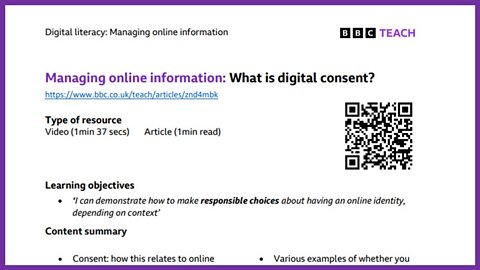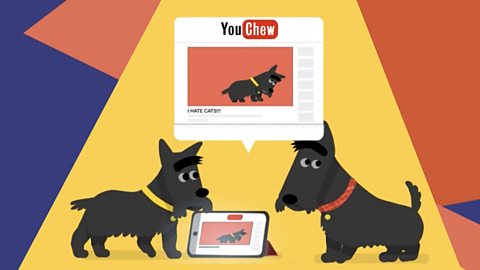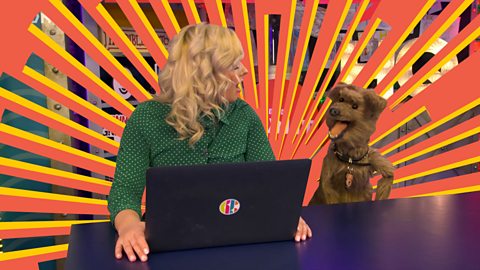Video summary
This video looks at what digital consent is and how this relates to online activity. It explores the power and choices to challenge othersβ actions, and gives various examples of whether someone would or would not grant consent. It also looks at what someone should think about when they consent to online.
Top tips and advice on what to do when setting up a profile online
Did you know that when you like, share or comment something online you are may be giving away some information about yourself?
When you first set up a profile on an app or social media platform, you have to agree to the terms and conditions, or Ts and Cs.
Basically, when you sign up to those rules you are giving the app permission to use your content and information. Giving permission to something is sometimes called 'consent' - digital consent is what you do and don't agree to sharing online.
Though it might seem we have no control over what social media platforms can do, we have some power to decide what we want to share and who can see it. The first step could be to make your account private so that only your friends and family can see what you post.
Another part of consent is thinking about the pictures or videos your friends, parents or guardians take of you. Have a conversation with them and let them know if you donβt feel comfortable with them sharing certain images or videos of you online. And of course, never post a photo or a video of your friends without asking for permission first.
Remember that having the confidence to say no is key to owning your life online. You should get to choose what you agree to being posted about you as this makes up your digital footprint.
Video: 1 mins 23 secs
Article: 1 min read
Learning objectives
(from the set out by the UK Council for Internet Safety)
- βI can demonstrate how to make responsible choices about having an online identity, depending on context
Glossary
- Digital Content: any text, images, or videos that exist online in the digital world
- Consent: giving or being given permission to do something
- Decide: making a choice from a number of alternatives
- Agree: to have the same opinion on something
- Rights: a moral or legal entitlement to something
- Private: not public
Topic introductions and starters
Before the video:
- Discuss in pairs what the pupils think consent means, and why this might be important in staying safe online - write down at least one point
After the video:
- Check pupilsβ understanding of the key vocabulary β digital content, consent, decide, agree, rights, private
- Write a simple one sentence βdictionaryβ definition of key vocabulary - share with the class and decide the best version
- Summarise the key points - either in pairs or as a class - discuss and agree on a final summary
- In small groups make a list of scenarios in their daily lives that might need their consent - some online, some offline
- Roleplay in pairs saying yes and saying no to the scenarios shown in the video, and any others that you want to include
- Work through the Terms and Conditions Quiz (ADD URL LINK) mentioned in the article as a class, discuss the answers - are the pupils surprised?
Discussion Points
How does it feel to have something posted or shared without your consent? Is it upsetting? Frightening? Annoying? Funny?
Do your parents/adult family members have the right to post your information or photos without asking you first? Should they always check? What about when you were a baby and couldnβt give consent? Arenβt they just showing they are proud of you?
How old should you be before you can give consent? Do you always check with friends before posting/sharing things with them in? What happens if they say no? Are they just being silly?
What should you do if you see something has been shared without your consent? Report the person who shared? Tell an adult? Share something about them without their consent? Try and get them to take it down? Tell them how it makes you feel?
What do you think big social media companies can do with your photos and personal information? Sell it to advertisers? Keep it private? Use it to personalise your profile? Use it for their own advertising? Share it with other people in the app without telling you?
Do you ALWAYS read the terms and conditions before accepting them? Be honest!
Fillers and fast finisher activities
- Make a list of possible scenarios where consent is an issue - suggest strategies for dealing with them
- Create a seven-line Acrostic poem about the issues with CONSENT as the first letters of each line
- Write a list of different ways of refusing consent if asked - compare positive/polite versions and more aggressive/negative ways
Signposting potential homework activities
- Share the video with family and parents/guardians - ask for their feedback and ideas around the issue
- Check some of the apps and services your families use - find the terms and conditions and read them through carefully
- Create a simplified version of a Terms and Conditions agreement that would be suitable for your own age group
- Create a glossary of the key vocabulary used in the article and what each word or phrase means in child-friendly language.
For download/printing

More on: Managing online information
How images and videos can easily be manipulated. video
An animation showing how Will's video from his YouChew channel is edited to make him look silly.

Regretting a post? Hereβs what to do video
Kemi Rodgers, Rio Fredrika and Lauren Layfield give their advice on what to do if you've posted something online you shouldn't have.

Katie and Hacker's online sharing dilemmas. video
Katie Thistleton and Hacker discover how easy it is to make a mistake when sharing your life online.
